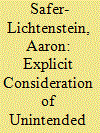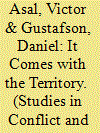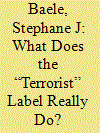|
|
|
Sort Order |
|
|
|
Items / Page
|
|
|
|
|
|
|
| Srl | Item |
| 1 |
ID:
165308


|
|
|
|
|
| Summary/Abstract |
This article investigates the social media content of women who are affiliated with the Islamic State. Throughout one year, ninety-three Twitter accounts were tracked to explore the patterns of engagement by pro–Islamic State women online and examine how these patterns illuminate the roles that pro–Islamic State women occupy on social media networks. The study reveals that women who associate with the Islamic State mostly preserve the traditional gendered role of support in the online realm. However, support is not their exclusive role and some women are active in the organization, using Twitter to recruit, promote, and even commit terrorist violence.
|
|
|
|
|
|
|
|
|
|
|
|
|
|
|
|
| 2 |
ID:
165303


|
|
|
|
|
| Summary/Abstract |
We take the opportunity presented by the fiftieth anniversary of the death of Che Guevara to reexamine his life and revolutionary program and the legacy he left behind. Attention is given to the formative influences that led to his introduction to Fidel Castro and his involvement in the Cuban revolution. We take a close look at the stylized theory of revolution that emerged from this experience, his reflective writings on the subject, and his subsequent attempts to generalize and apply his revolutionary model in the Congo and Bolivia. This model is critically interpreted and evaluated through the lense of his eleven month Bolivian campaign. We conclude by examining the ‘paradox’ of Che Guevara. He was a failed guerrilla who remains an iconic symbol of the revolutionary Left. He was an authentic true believer who dreamed that it might be possible to one day forge a utopian society of ‘new men’ and yet, fifty years after his death, his revolutionary project is farther away from being realized than ever. His heroic image, in the meantime, has evolved to become one of the most successful capitalist brands in history.
|
|
|
|
|
|
|
|
|
|
|
|
|
|
|
|
| 3 |
ID:
165306


|
|
|
|
|
| Summary/Abstract |
Criminologists and terrorism specialists alike have conducted research on the deterrent effect of policies; however, to date, only criminologists have thoroughly examined the associated displacement of crime and diffusion of benefits. Using data from the Eco-Incidents Database, this study first examines the deterrent effect of government efforts targeting animal rights and environmental terrorism over several years. Next, it extends this application by examining nonterrorist actions by both terrorist groups and nonterrorist groups to see if deterrent actions have any unintended consequences. Results show no evidence of displacement, but rather that several government actions evidenced a diffusion of benefits.
|
|
|
|
|
|
|
|
|
|
|
|
|
|
|
|
| 4 |
ID:
165307


|
|
|
|
|
| Summary/Abstract |
The quality of studies drawing primary data from terrorists and violent extremist respondents varies substantially, with this body of literature exhibiting a variety of repeating methodological issues. For instance, researchers often uncritically accept interviewee responses at face value, overlook key theoretical insights, downplay or neglect potentially important explanatory variables, fail to offer sufficient information about their sampling methods, and deliver findings with inferences beyond what their sample allows. Indeed, certain studies demonstrate a number of these flaws, including the United Nations Development Programme's recently published Journey to Extremism in Africa report. Within this context, the dual purposes of this article are (a) to discuss ways to overcome these specific methodological problems, and (b) to provide broader guidance for face-to-face research with such respondents.
|
|
|
|
|
|
|
|
|
|
|
|
|
|
|
|
| 5 |
ID:
165304


|
|
|
|
|
| Summary/Abstract |
Given that minority ethno-political organizations are generally weaker than states yet seek to change their policies or remove the ruling regime from power, why would negotiation occur? States prefer to ignore or repress such organizations, which typically have little to offer in return amidst negotiations that can legitimize them while delegitimizing the state. When a challenging organization establishes governing structures and controls movement in part of a state's territory, however, it can easily inflict significant economic and political costs on the state while also possessing a valuable asset to exchange for concessions. An organization with territorial control cannot be ignored, while the state will have a strong incentive to negotiate before the state loses more face, the group gains more legitimacy, neighboring states are more likely to invade, and the international community is more likely to formally recognize any facts on the ground as a new status quo. Our analysis of 118 organizations in the Middle East and North Africa from 1980–2004 reveals that territorial control is the most important determinant of intrastate negotiation. In regards to existing scholarship, this suggests that a certain type of successful violence works—not all violence and not only nonviolence—while certain types of strong organizations—those that control territory—are more likely to reach negotiations with the state than weak ones.
|
|
|
|
|
|
|
|
|
|
|
|
|
|
|
|
| 6 |
ID:
165305


|
|
|
|
|
| Summary/Abstract |
This article argues that video games have become a valid and increasingly significant means of jihadist digital propaganda. “Gaming jihad” has recently shown interesting alterations, mostly due to actions undertaken by the so called Islamic State and its cyber-partisans, which have discovered new ways of using this flexible and immersive medium. Similar to more conventional forms of its online propaganda, which have been imitated by other Islamist terrorist groups for years, the “Caliphate's” exploitation of electronic entertainment software may be a forerunner for the increased interest of other violent extremist organizations in this medium.
|
|
|
|
|
|
|
|
|
|
|
|
|
|
|
|
| 7 |
ID:
165313


|
|
|
|
|
| Summary/Abstract |
In order to move beyond the existing push/pull framework to understand disengagement, we apply a systematic coding scheme derived from Mayer and colleagues' integrative model of organizational trust to examine why people leave extremist groups. In doing so, we also rely on in-depth life history interviews with twenty former left- and right-wing extremists to examine whether antecedents of distrust vary between the two groups. Findings suggest substantial similarities and important differences between left- and right-wing extremists' decision to leave. In particular, perceptions of poor planning and organization, low-quality personnel and vindictive behavior generate perceptions of organizational distrust and disillusionment. Although findings from the current study are based on a relatively small sample, notable similarities were identified between both groups regarding sources of distrust (e.g., leaders, group members). We also identified differences regarding the role of violence in weakening solidarity and nurturing disillusionment with extremist activities. We conclude this article with suggestions for future research that extend the study of terrorism and that may have significance for how practitioners address countering violent extremism initiatives.
|
|
|
|
|
|
|
|
|
|
|
|
|
|
|
|
| 8 |
ID:
165310


|
|
|
|
|
| Summary/Abstract |
This article will explore the perception of individuals associated with civil society and working in Boko Haram–affected areas. This will compare the reality as reflected by former Boko Haram members. Central to this analysis will be who, why, and how individuals get involved in Boko Haram. Comparing perceptions with empirical evidence, civil society actors, but also policymakers tasked with addressing violent extremism, are reminded not to rely on perceptions when developing and implementing preventative measures and countermeasures. Additionally, a larger than expected former female Boko Haram sample was included that allowed a comparison to be made between the male and female samples, with specific reference to why and how women became members of Boko Haram.
|
|
|
|
|
|
|
|
|
|
|
|
|
|
|
|
| 9 |
ID:
165312


|
|
|
|
|
| Summary/Abstract |
This article aims to explain the endurance of Sinai's insurgency despite its limited military capacity and resources, and the overwhelming man- and fire-power of the incumbent's regular and tribal forces. After reviewing the literature on how insurgents beat or survive strong incumbents, the article offers a short overview of historical developments and socio-political causes leading to the rise of Sinai Province and its military build-up. It then analyses, qualitatively and quantitatively, how Sinai Province fight, based on its original documents and releases as well as on interviews with individuals who fought against it. Finally, the article concludes with an explanation of why did the insurgency survive and, at times, expanded based on the quality of its military tactics. It also provides policy implications, as a result.
|
|
|
|
|
|
|
|
|
|
|
|
|
|
|
|
| 10 |
ID:
165314


|
|
|
|
|
| Summary/Abstract |
This article assesses how Violent Dissident Irish Republican (VDR) groups have turned to funerary practice as a spoiling tactic in post–Good Friday Agreement Northern Ireland. In doing so it moves the lens of interrogation away from the residual violence exercised by these groups and onto other nonviolent mechanisms and strategies. Locating this discussion within the wider study of the VDR phenomenon, the article asserts that militarized and ritualized funerals possess propagandistic and mobilizational benefits that make them particularly conducive to spoiling activity in a post-conflict site that is increasingly embracing the process of normalization.
|
|
|
|
|
|
|
|
|
|
|
|
|
|
|
|
| 11 |
ID:
165309


|
|
|
|
|
| Summary/Abstract |
For America's foes in Afghanistan and the Middle East, triumph on the battlefield is less important than winning the battle of perceptions. In response, the United States has turned to Strategic Communication and Public Diplomacy (SC-PD) to engage key audiences in ways that advance U.S. interests and to win the political-ideological contest for domestic and international legitimacy. But are these strategies effective? While winning hearts and minds is politically important, SC-PD—even at its best—is much less effective than other well-crafted and mutually supportive policies and strategies. Moreover, there are structural obstacles that greatly limit the effectiveness of SC-PD.
|
|
|
|
|
|
|
|
|
|
|
|
|
|
|
|
| 12 |
ID:
165311


|
|
|
|
|
| Summary/Abstract |
Many scholars and practitioners claim that labeling groups or individuals as “terrorists” does not simply describe them but also shapes public attitudes, due to the label's important normative and political charge. Yet is there such a “terrorist label effect”? In view of surprisingly scant evidence, the present article evaluates whether or not the terrorist label—as well as the “Islamist” one—really impacts both the audience's perception of the security environment and its security policy preferences, and if yes, how and why. To do so, the article implements a randomized-controlled vignette experiment where participants (N = 481) first read one out of three press articles, each depicting a street shooting in the exact same way but labeling the author of the violence with a different category (“terrorist”/“shooter”/“Islamist”). Participants were then asked to report on both their perceptions and their policy preferences. This design reveals very strong effects of both the “terrorist” and “Islamist” categories on each dimension. These effects are analyzed through the lenses of social and cognitive psychology, in a way that interrogates the use of the terrorist category in society, the conflation of Islamism with terrorism, and the press and policymakers' lexical choices when reporting on political violence.
|
|
|
|
|
|
|
|
|
|
|
|
|
|
|
|
|
|
|
|
|